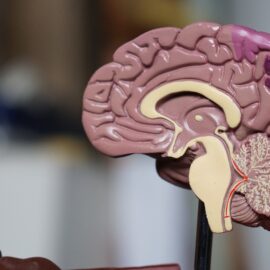

This article gives you a glimpse of what you can learn with Shortform. Shortform has the world’s best guides to 1000+ nonfiction books, plus other resources to help you accelerate your learning.
Want to learn faster and get smarter? Sign up for a free trial here .
What is good versus evil? Is morality relative or fixed?
Good and evil are common topics found in religion, ethics, psychology, philosophy, and more. To many, good and evil define what is right and wrong in the world. But it can be hard to determine what exactly tips the scale of morality.
We’ll explore the good versus evil debate below by examining their definitions and how someone becomes good or evil.
Morality Debates Throughout History
The question of good versus evil and where morality comes from has plagued philosophers for centuries. One of the most common theories is that morality is innate. However, the truth is more complex.
The Righteous Mind by Jonathan Haidt says that morality is culture-dependent. For example, Westerners are unique in their prioritization of individual rights over the common good. The individualistic society, in which Westerners live now, is a product of the relatively recent Enlightenment. In individualistic societies, the role of society is to serve the individual. However, most societies subordinate the needs of the individual to the needs of the group—they are sociocentric.
Individualistic and sociocentric societies make different moral judgments. For example, in a sociocentric society, it might be morally wrong to move away from your family to pursue a promotion, whereas this is expected in an individualistic society. This shows that, contrary to what many people think, morality isn’t innate.
Friedrich Nietzsche on Moral Relativism
Philosopher Friedrich Nietzsche seems to agree that morality is a relative concept. According to his book Thus Spoke Zarathustra, as a unique individual, what’s good for someone else may not be good for you and vice versa. The main character, prophet Zarathustra, denounces any objective distinction between good versus evil as a concept that humans invented to control others, usually in ways that promote conformity and thereby hinder progress.
For example, suppose someone is fascinated with stealing. If she cultivates this passion and becomes an expert thief, her children might become even better thieves because of what they learn from her and inherit genetically. So stealing would become an increasingly refined trait for natural selection to either favor or weed out. But if she suppresses her inclination to steal for fear of criminal punishment, that won’t happen, and natural selection will be less effective because the population will be more uniform.
Zarathustra doesn’t teach that you can arbitrarily decide what’s right and wrong for you, as some proponents of moral relativism do. Instead, he teaches that you should identify and cultivate your personal virtues: your innate strengths and passions. Pursuing these is good—even if other people try to label your passions as vices.
What Is Evil?
In The Lucifer Effect, Philip Zimbardo defines evil as any intentional harm done to innocent people. Most people assume that if someone does something truly evil—on the level of murder, torture, or rape—there must be something uniquely twisted about them. They’re an “evil person,” and it would be difficult or impossible to rehabilitate them.
Zimbardo offers an opposing theory: He argues that any one of us could commit the worst evil imaginable if we found ourselves in the wrong situation. (We’ll call this the “theory of circumstantial morals” because it implies that each individual’s moral compass can change rapidly in response to new circumstances.)
In other words, Zimbardo argues that evildoers are ordinary people who find themselves in situations that cause them to disengage their normal sense of morality. Interviews have confirmed that many people who do great evil—terrorists, torturers, and those who facilitate genocide—are otherwise psychologically healthy and rational. They’re just like any of us.
The Happiness Hypothesis by Jonathan Haidt dives further into the theory that evildoers are psychologically rational by proclaiming they feel justified to commit evil acts.
In the 1990s, social psychologist Roy Baumeister identified what he called the myth of pure evil—the idea that people who commit heinous acts do so out of pure cruelty and a desire to hurt. In his study of both perpetrators and victims of cruelty, Baumeister found that this was rarely the case. Most perpetrators were responding to what they perceived as some injustice done against them. In their minds, they were the victims, not the perpetrators.
Baumeister found that there was actually far more nuance and complication surrounding even the most appalling crimes. Murders, for example, were often the result of an escalating tit-for-tat cycle of aggression and counter-aggression between the perpetrator and the ultimate victim. Often the murderer could have just as easily ended up as the victim.
Believing that one’s opponents are pure evil is how perpetrators rationalize extreme acts of violence against their victims. Idealism is a major driver of this, as anything can be justified to defeat those who stand in the way of one’s utopian vision.
How Do People Become “Evil”?
If Zimbardo’s theory of circumstantial morals in The Lucifer Effect is true and the wrong situation can turn anyone evil, then what circumstances determine whether we do good or evil? These are the three main situational variables that can transform any upstanding citizen into an evildoer:
- Identity cues can cause a drastic shift in morals. Zimbardo explains that identity cues are aspects of the environment we draw on when shaping our self-image and determining how to act. These can include specific locations, clothing and other props, and the expectations of others. In extreme cases, if we’re ensnared in enough environmental cues placing us in a given role, these roles can take hold of our emotions and influence us to do things we never would have rationally agreed to do.
- Social pressures influence us to act immorally. When the people around us want us to do something evil, it becomes significantly more difficult for us to resist. These social pressures come in two main forms that often overlap: group pressure and authoritative pressure.
- Awareness of individuality is the final morality-shifting circumstantial variable. Zimbardo explains that people disengage their sense of morality when they lose the sense that they and the people they are mistreating are unique individuals. This lack of awareness comes in two forms: anonymity and dehumanization.
What Is Good?
In Nicomachean Ethics, Aristotle creates his own definition of goodness to add to the good versus evil discussion. He claims people are morally virtuous when they habitually do virtuous actions for virtuous reasons. Both of these components are essential to virtue.
People aren’t born naturally virtuous, so it’s something they have to learn—and people learn through repeated action. It makes no sense to call someone virtuous if they don’t consistently do virtuous things, just as it makes no sense to call someone a great chef just because they occasionally make toast. In addition, Aristotle argues that there aren’t simple, universal rules someone can follow to be virtuous. Instead, a virtuous person must determine what is appropriate for each individual situation and then do it.
For example, Frank is morally virtuous. Growing up, his parents taught him to help those who can’t help themselves—a tenet that Frank has always lived by. One day, Frank sees a child who’s trapped at the bottom of a well. He immediately grabs a nearby rope and helps the child up, then gets the child home. Frank isn’t morally virtuous just because he saved the child, though (a single virtuous act)—he’s morally virtuous because he always helps those in need (he habitually acts virtuously).
How to Be Good
To be virtuous, a person must do virtuous actions for the right reasons. People learn to be virtuous through habit—and they won’t learn or create habits from accidentally or unintentionally doing virtuous things. Therefore, virtuous acts are intentional, voluntary, and done for virtue itself rather than some other benefit.
For example, morally virtuous Frank helps an old woman cross the street because it’s the right thing to do—not because she’ll give him money for it, or because it’ll make him look good in front of his friends.
People can also become good through habit. Becoming morally virtuous involves three main components:
- Maintaining a mean between two vices
- Experiencing pleasure and pain
- Receiving moral education
Virtue as a Mean Between Two Vices
People become virtuous by developing specific virtues through habitual action—a person becomes courageous by doing courageous things, for example. However, Aristotle suggests that these virtues can only exist as a happy medium, or “mean.” An overdeveloped or underdeveloped quality isn’t virtuous at all, but rather a vice. For example, someone who has overdeveloped courage is reckless, while someone with underdeveloped courage is cowardly. Therefore, becoming virtuous requires proper development of individual virtues, practicing them in the right amount so they aren’t overdeveloped or underdeveloped.
Pleasure and Pain
Becoming virtuous also involves “training” a person to develop a clear sense of what’s emotionally pleasant or painful—what they like and dislike. This is because moral virtues deal exclusively with matters of pleasure and pain. These emotions are the lens through which people understand actions and their consequences: For example, random acts of violence are immoral because they cause pain for no reason.
To become morally virtuous, a person must learn to take pleasure in virtuous things and to feel pain at vice or wrongdoing. This process aligns the rational and emotional parts of themselves: The rational part knows virtuous things are good, and the emotional part enjoys and desires virtuous things because it’s been conditioned to take pleasure in them. Therefore, a morally virtuous person doesn’t do virtuous things because of unemotional deliberation—they do virtuous things because it feels good and because they hate what’s immoral.
For example, morally virtuous Frank learns that his landlord is scamming his neighbor Linda. Rationally, he knows that scamming is immoral and that stopping his landlord is the morally virtuous thing to do. Emotionally, he’s mad that the landlord is scamming Linda and desires a just outcome. Frank’s rational response tells him what he should do, and his emotional response inspires him to do it.
Moral Education
Aristotle suggests that to develop the necessary habits and “training” for virtue, a person needs education from a virtuous teacher starting from childhood. This education begins with imitation: Instead of asking, “What is the virtuous thing to do in this situation?” a student asks, “What would my teacher do in this situation?” A teacher will also recognize the proper “mean” unique to their student: For example, a brave but impulsive student needs to spend more time on moderate actions than courageous actions.
Final Words
The good versus evil conversation has been discussed for centuries, and likely we’ll continue to discuss it for more years to come. Everyone has their own definitions of good and evil. But you have to decide your own definitions to determine what type of person you’ll be in this world.
Did we miss anything important to add to our good versus evil breakdown? Let us know in the comments below!

Want to fast-track your learning? With Shortform, you’ll gain insights you won't find anywhere else .
Here's what you’ll get when you sign up for Shortform :
- Complicated ideas explained in simple and concise ways
- Smart analysis that connects what you’re reading to other key concepts
- Writing with zero fluff because we know how important your time is






